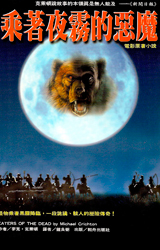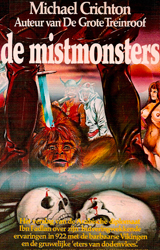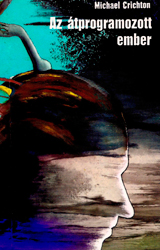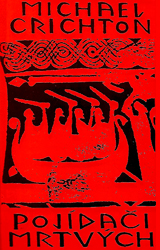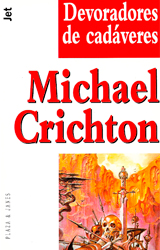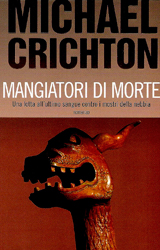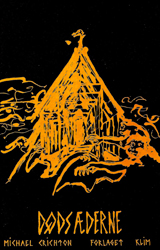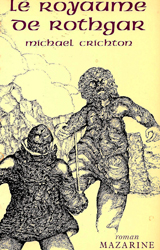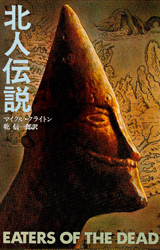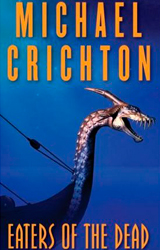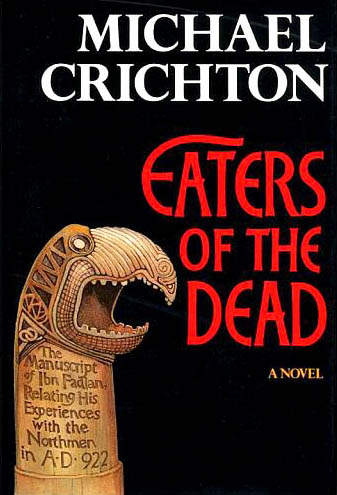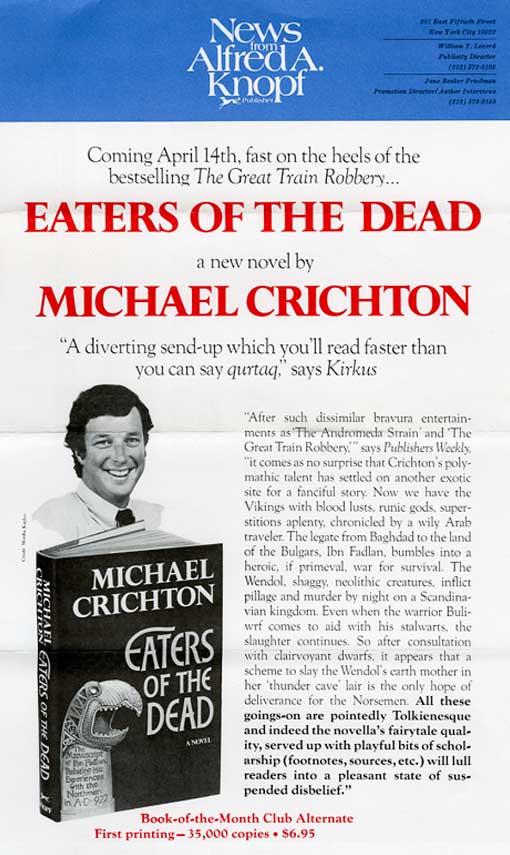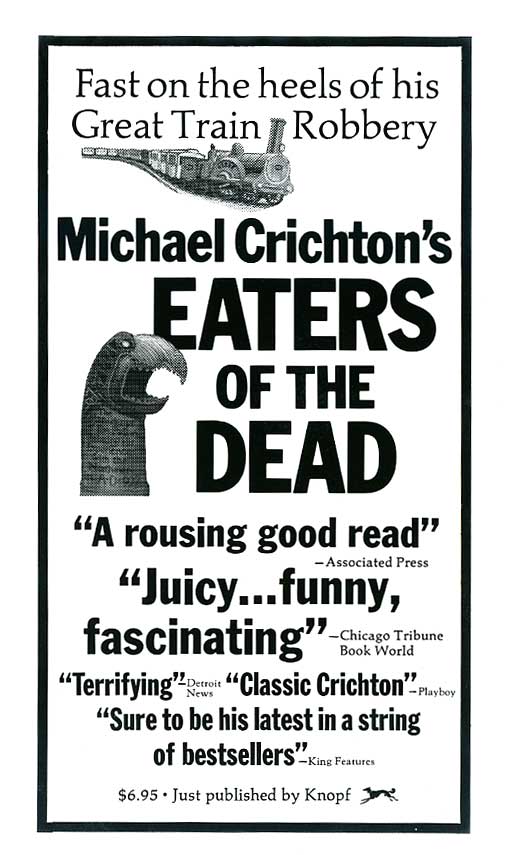Eaters of the Dead
In His Own Words
The story behind this novel appears in an essay in the paperback edition. The short version is, I wrote Eaters of the Dead on a bet that I could make an entertaining story out of Beowulf.
It’s an unusual book. Readers either like it, or they don’t. I’m quite pleased with the movie (13th Warrior), which I think captures the feeling of the novel very well.


Synopsis
The year is A.D. 922. A refined Arab courtier, representative of the powerful Caliph of Bagdad, encounters a party of Viking warriors who are journeying to the barbaric North. He is appalled by their Viking customs — the wanton sexuality of their pale, angular women, their disregard for cleanliness . . . their cold-blooded human sacrifices.
But it is not until they reach the depths of the Northland that the courtier learns the horrifying and inescapable truth: He has been enlisted by these savage, inscrutable warriors to help combat a terror that plagues them — a monstrosity that emerges under cover of night to slaughter the Vikings and devour their flesh.
Passage 1
These Northmen are by their own accounting the best sailors in the world, and I saw much love of the oceans and waters in their demeanor. Of the ship there is this: it was as long as twenty-five paces, and as broad as eight and a little more than that, and of excellent construction, of oak wood. Its color was black at every place. It was fitted with a square sail of cloth and trimmed with sealskin ropes. The helmsman stood upon a small platform near the stern and worked a rudder attached to the side of the vessel in the Roman fashion. The ship was fitted with benches for oars, but never were the oars employed; rather we progressed by sailing alone. At the head of the ship was the wooden carving of a fierce sea monster, such as appears on some Northmen vessels; also there was a tail at the stern. In water this ship was stable and quite pleasant for traveling, and the confidence of the warriors elevated my spirits.
Passage 2
Now the night was fully black, and the warriors of Buliwyf awaited the coming of the dragon Korgon. All eyes were turned towards the hills, now lost in the midst of night. Buliwyf himself strode the length of the fortifications, carrying his great sword Runding, speaking low words of encouragement to his warriors. All waited quietly, save one, the lieutenant Ecthgow. This Ecthgow is a mast of the hand axe; he had set up a sturdy post of wood some distance from him, and he practiced the throw of his hand axe to this wooded post, over and again. Indeed, many hand axes had been given him; I counted five or six clipped to his broad belt, and others in his hands, and scattered on the ground around him.
Passage 3
Praise be to God, the Merciful, the Compassionate, the Lord of the Two Worlds, and blessing and peace upon the Prince of Prophets, our Lord and Master Muhammad, whom God bless and preserve with abiding and continuing peace and blessings until the Day of the Faith!
This is the book of Ahmad ibn-Fadlan, ibn-al-Abbas, ibn-Rasid, ibn-Hammad, a client of Muhammad ibi-Sulayman, the ambassador from al-Muqtadir to the King of the Saqaliba, in which he recounts what he saw in the land of the Turks, the Hazars, the Saqilba, the Baskirs, the Rus, and the Northmen, of the histories of their kings and the way they act in many affairs of their life.
From the Archives
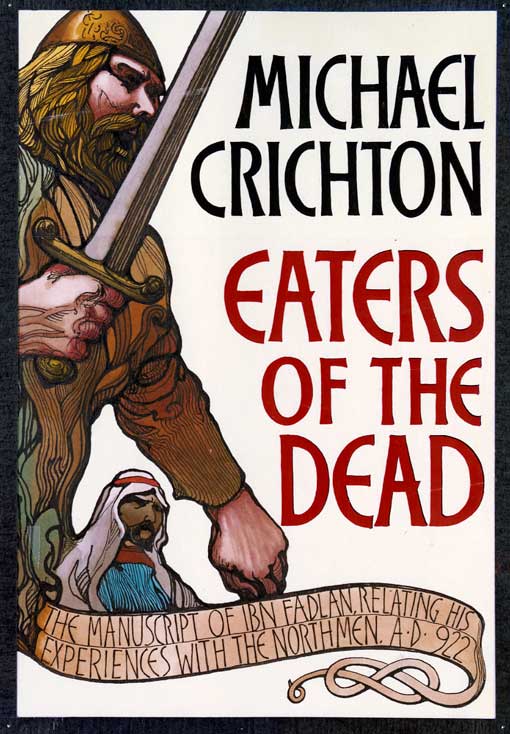

This is an early cover design for Michael Crichton’s Eaters of the Dead.
Eaters of the Dead Promo Material
In His Own Words
Jerry [Goldsmith] has written something like 250 film scores, and now that he is 70 years old has decided to “cut back” to 5 scores a year! Not long ago he gave a concert in Carnegie hall, and there in the audience were all his producers and directors.
I myself have done a half-dozen projects with him, going back thirty years, and I believe the explanation for his great success is extremely simple: Jerry is a musical genius, and he works hard. Of course, Jerry’s been my good friend for many years, and sometimes I think I’m too impressed with him, and hold him in too high regard. A while back, I was looking at the beginning of The Edge and thought, “Hey, whoever wrote this score is terrific, too.” And then the credits start: it’s Jerry. I had a similar thought as Air Force One, began, thinking wow, this score is great, percussive and clean and tense. But that was Jerry, too.
As for his score for The 13th Warrior, it’s all that I ever hoped for—and just what I expected.
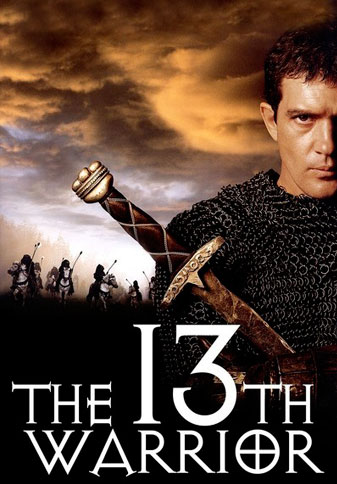

The 13th Warrior (Movie)
| Release Date: | August 27, 1999 |
| Running Time: | 1 hr. 42 min. |
| MPAA: | R |
| Director: | John McTiernan |
| Screenwriter: | William Wisher and Warren Lewis |
| Based on the Novel By: | Michael Crichton |
| Studio: | Touchstone Pictures |
| Starring: | Antonio Banderas, Diane Venora, Omar Sharif |
In His Own Words
I changed the title [from Eaters of the Dead] because the original was just too disturbing for many people. Changing the title was my idea; the studio didn’t want to do it. But I felt we should. During filming, people would say to me, “What are you working on?” and I would say, Eaters of the Dead. And they would say, “What? What’s it called?” and then when I repeated the title for them, most of the people said, “I don’t want to see that” or “Ugh, I’ll skip that one.” They didn’t even ask what it was about, they were just put off by the title. The other thing was that people couldn’t remember the title. “What is it? The People Eaters?” That meant to me that there was a problem with the title. So we changed it.
Book Covers
